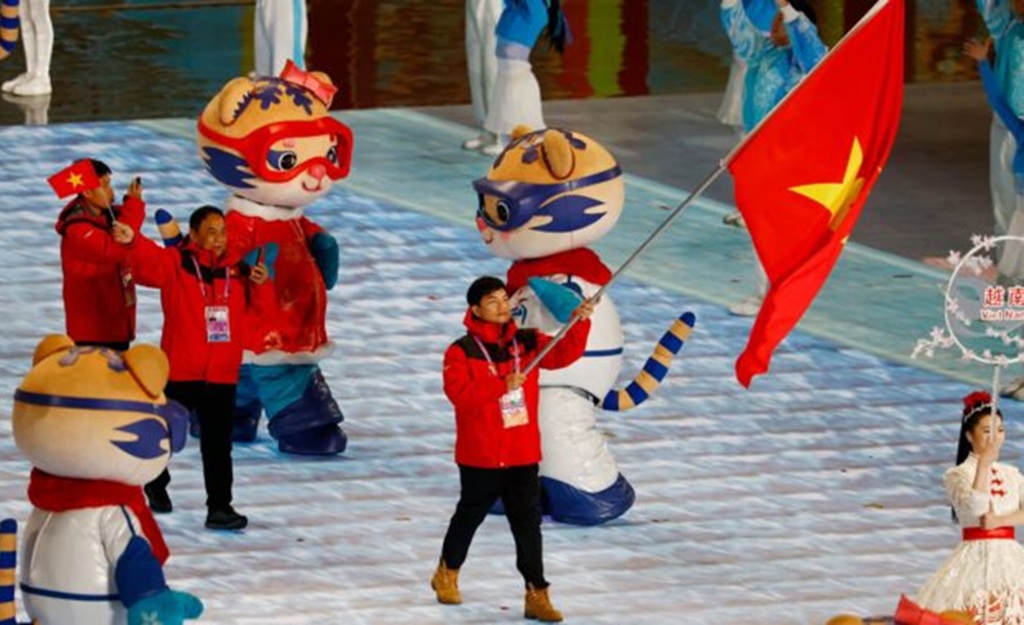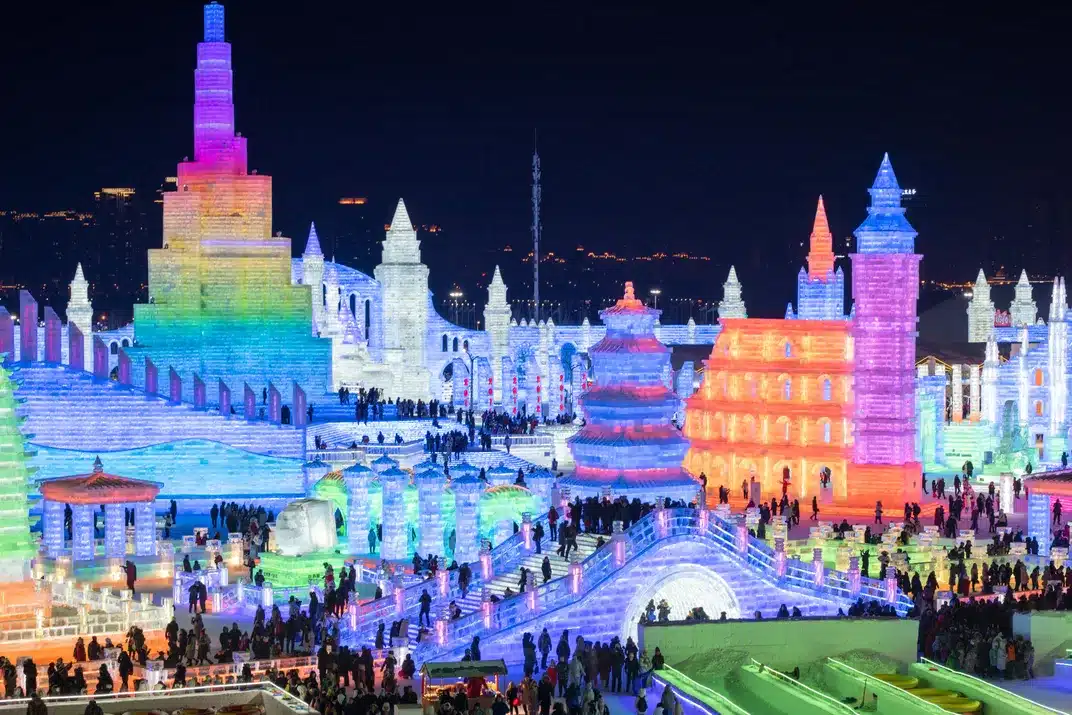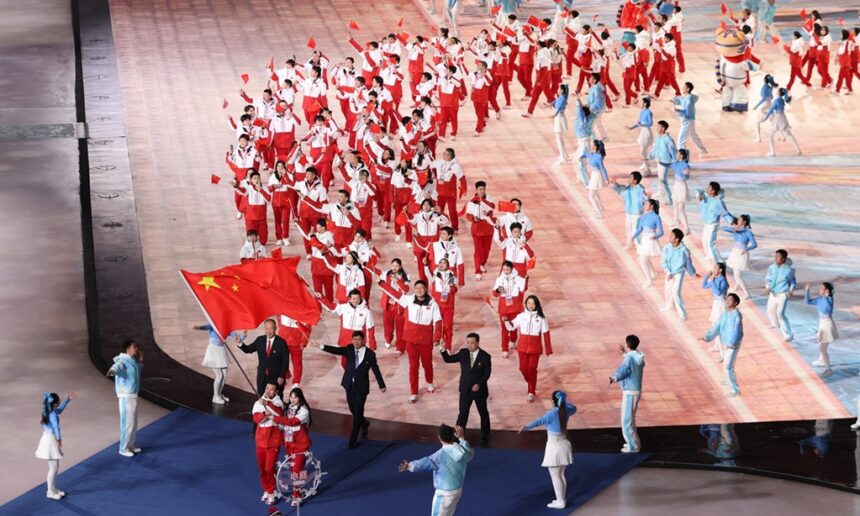China’s President Xi Jinping officially launched the 9th Asian Winter Games on Friday evening in n Harbin, Northeast China’s Heilongjiang Province with a vibrant ceremony showcasing the city’s ice and snow heritage.
The event, held in Harbin, Heilongjiang Province in Northeast China, follows other major international events hosted by China, including the 2022 Beijing Winter Olympics and the 2023 Hangzhou Asian Games. Analysts suggested the Games not only promote winter sports development but also convey China’s message of global unity and friendship.
The opening ceremony began with delegations taking the stage in alphabetical order at the Harbin International Conference, Exhibition and Sports Centre.
The audience warmly welcomed athletes from Hong Kong, Macao, and Chinese Taipei, who entered accompanied by mascots Binbin and Nini. The crowd’s enthusiasm peaked when the host nation, China, entered last, led by star speed skater Ning Zhongyan and young freestyle skier Liu Mengting as flag bearers.

China’s Olympic Champions
The ceremony featured dazzling performances blending advanced technology with local artistry, all themed around ice and snow.
The cauldron, designed as a blooming lilac flower, was lit by a group of Chinese Olympic champions, including short-track speed skater Yang Yang, freestyle skier Han Xiaopeng, race walk champion Wang Zhen, and speed skater Zhang Hong. This took place at Harbin Ice-Snow World, the largest ice-and-snow-themed park globally.
The Games, running from February 7 to 14, serve as a key preparation for Asian nations ahead of the 2026 Olympic Winter Games. The first gold medal is set to be awarded on Saturday.
Before the opening ceremony, President Xi and his wife Peng Liyuan hosted a banquet for visiting dignitaries, including leaders from Brunei, Kyrgyzstan, Pakistan, Thailand, South Korea, and officials from the International Olympic Committee and the Olympic Council of Asia.
Xi highlighted the Games’ theme, “Dream of Winter, Love among Asia,” emphasizing shared goals of peace, development, and friendship. He called for regional unity, joint efforts against security challenges, and deeper collaboration to foster inclusive economic growth and global stability.
The Games also underline Asia’s growing presence in winter sports, with countries like Cambodia and Saudi Arabia participating for the first time. More than 1,200 athletes from 34 nations and regions are competing, making this the largest edition in terms of participants.
Experts see the Asian Winter Games as a platform to strengthen cooperation in a fragmented world. Li Haidong, a professor at China Foreign Affairs University, noted that Asia, as a driving force of global economic growth, plays a crucial role in promoting solidarity amid global uncertainties.

Harbin is China’s “Ice City”
This event continues a streak of major winter sports competitions held in Asia, following the 2017 Sapporo Asian Winter Games, the 2018 PyeongChang Winter Olympics, and the 2022 Beijing Winter Olympics.
Analysts have observed that nations without natural winter sports conditions are increasingly taking part, reflecting the growing appeal of ice and snow sports across Asia.
Ru Xiuying of the Olympic Research Centre at Capital University of Physical Education and Sports stated that the Games demonstrate efforts to build a shared future for mankind. Over the past 20 years, China has hosted numerous major events, fostering global sports exchanges and encouraging broader participation.
Harbin, known as China’s “ice city,” is the birthplace of the country’s modern winter sports culture. It previously hosted the Asian Winter Games in 1996. Selected as the 2025 host city in July 2023, Harbin had just 600 days to prepare, far less than the typical seven-year timeline for such events. Despite this, all competitions are being held in existing venues, marking the first time China has hosted a regional event without building new facilities.
The Games have also boosted tourism and local development. Harbin recorded 87 million visitors in 2023, generating 124.8 billion yuan in tourism revenue, a significant year-on-year rise. During the Lunar New Year holiday, Harbin Ice-Snow World and Yabuli ski resort saw record-breaking visitor numbers.
China’s ice and snow economy has expanded rapidly since the Beijing 2022 Winter Olympics, with 313 million people participating in winter activities by early 2024. Last winter, over 385 million domestic winter leisure trips were recorded, along with a 50% increase in related revenue. Projections suggest the ice and snow economy could surpass 1 trillion yuan by 2025 and reach 1.5 trillion yuan by 2030.
The Asian Winter Games in Harbin highlight China’s ongoing commitment to winter sports and their integration with culture, tourism, and the broader economy. Ru Xiuying noted that beyond competition, ice and snow sports are driving cultural and economic growth. Thai curling athlete Chanatip Sonkham praised the event’s organization, lauding the volunteers, facilities, and overall experience.
International Olympic Committee President Thomas Bach credited the excitement surrounding the Games to the legacy of Beijing 2022, which has inspired athletes from regions with no tradition in winter sports, such as Qatar and Saudi Arabia. “This legacy is bringing winter sports to more countries and athletes than ever before,” Bach said.
The 9th Asian Winter Games not only celebrate athletic excellence but also highlight regional cooperation and the economic potential of winter sports in Asia.
Related News:
Foreign Tourist Flock to China’s Ice City in Heilongjiang Province

Geoff Thomas is an award winning journalist known for his sharp insights and no-nonsense reporting style. Over the years he has worked for Reuters and the Canadian Press covering everything from political scandals to human interest stories. He brings a clear and direct approach to his work.














